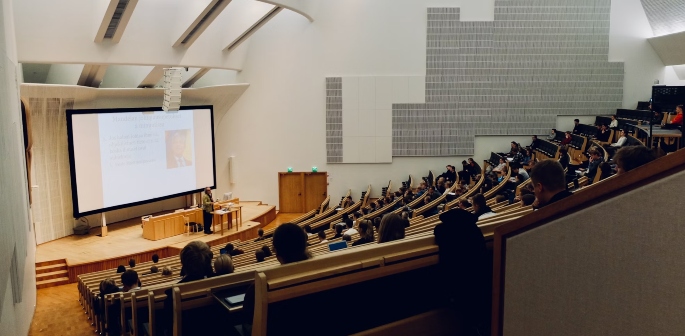“Business investment has increased by 25.6%"
Education is universal but the system vastly differs in the UK and Pakistan.
Despite their geographical and cultural differences, these nations offer contrasting approaches to education, reflecting unique priorities, challenges, and achievements.
Key aspects such as curriculum design, teaching methodologies, assessment systems and educational outcomes differ.
We aim to unravel the strengths, weaknesses and potential areas of improvement in each country’s education framework.
We embark on a journey to understand and compare the education standards of Pakistan and the UK.”
The Structure of Education in Pakistan and the UK

Pakistan has a three-tier education system – elementary, secondary and tertiary/higher.
At the elementary level, education is not compulsory. Due to this, there is a low literacy rate.
According to the Pakistan government, in 1998, “over 5.5 million children (age group 5-9) are out of school”.
Most children enrol at the age of six and above.
Meanwhile, in the UK, the primary level is split into two stages – Key Stage 1 (age 5 to 6) and Key Stage 2 (6 to 11).
Secondary education in Pakistan spans four years, covering grades 9 to 12.
Contrarily, in the UK, secondary schools typically educate students aged 12-16, although it may extend to 17 or 18 for those pursuing A-Levels.
The educational landscape in England encompasses a diverse range of institutions, including Anglican, Jewish, Islamic, and Roman Catholic schools.
On the other hand, Pakistan exhibits limited diversity within its schooling system.
While education is compulsory from ages 14 to 16 in the UK, this mandate does not apply in Pakistan.
This variance is mirrored in the availability of trained teachers and educational resources, where the UK boasts more abundant provisions compared to Pakistan.
Regarding infrastructure, certain private schools in Pakistan rival higher education standards seen in the UK.
Higher education pathways diverge, with Pakistani students entering universities or colleges post-grade 12, whereas UK students typically progress to college or a 6th form before pursuing university after year 13.
Regarding degree durations, the UK offers three-year first-degree programs for full-time students, extendable to five years for part-time learners.
Conversely, Pakistani first-degree programmes range from two to four years, with specialised fields such as medicine and pharmacy requiring five years, and agriculture and engineering offering four to five-year programs.
UK course lengths vary. For example, medicine typically takes five years while law spans four years.
Master’s degrees are typically one year in the UK, contrasting with the two-year duration in Pakistan.
When it comes to PhDs, both countries require a minimum of three years.
Purpose for Education

Pakistan
Education in Pakistan serves a federal purpose, such as a government system, that deals with unity within internal affairs.
The national education system is formulated through a set of policies and plans.
This framework also includes supervision and monitoring of schools, which is implemented as per the district government’s policy.
Provinces develop their education plans in response to the country’s specific situation.
With devolution, Executive District Officers predominantly oversee school education.
The provincial government oversees policy formulation, teacher training and budgeting.
A report stated: “It was decided in the first national education conference in 1974 held at Karachi that the education system would work according to the national aspirations of Pakistan.”
One of the main components is to develop a “national character of Pakistani generation”.
The UK
On the flip side, education in the UK assumes distinct responsibilities tailored to individual countries.
These responsibilities include influencing the economy and culture, as well as preparing individuals for adult life.
Each country has its own institution dedicated to handling education matters.
Education serves as a crucial foundation for the economy, driving employment opportunities and attracting business investments as individuals attain higher levels of education.
The government website states:
“Business investment has increased by 25.6% since the first quarter of 2010.”
The advancement of knowledge and skills will aid individuals to thrive in a demanding economy.
Moreover, “adults with good literacy skills, are more likely to be in work than those with lower levels of literacy: 83% compared to 55%”.
Employers seek more highly skilled individuals entering the labour market and tend to favour STEM subjects – Science, Technology, Engineering and Mathematics.
Education in the UK also serves the purpose of preserving culture and contributing to a refined society.
Reasons to study in the UK over Pakistan

In the UK, degrees are globally recognised, with various courses on offer.
This is enticing for international students. However, studying expenses may be too expensive for international students.
Nevertheless, the UK offers a moderation of education fees.
Scholarships can also be granted. For Pakistani students in 2022, the British Council said 75 scholarships were given.
These grants and scholarships offer students a chance for higher education.
Some of the scholarships offered to international students in the UK include:
- Commonwealth Scholarships
- Erasmus Scholarships
- Chevening Scholarships
Studying in the UK offers students the opportunity to work part-time while pursuing their degree at university.
This helps students cover expenses, with earnings ranging between £460 to £800 per month, a massive amount when compared to the value in Pakistani rupees.
Working while studying not only brings financial stability but also provides valuable experience in the chosen field, enhancing future employability.
Shorter course options allow students to graduate within a year, saving significantly on tuition and living expenses without compromising quality.
Moreover, the UK offers post-study work visas for international students, allowing them to work in the UK after completing their studies.
This is particularly attractive to South Asian students, as it increases the likelihood of finding employment in their desired field in the UK.
Post-study work visas are typically valid for two years for master’s or bachelor’s degree holders and three years for PhD students, providing an extended opportunity to gain work experience and establish a career in the UK.
Typically, monthly expenses for international students are:
- Food (£180)
- Transport (£150)
- Accommodation (£400-£500)
- Utility bills (£40).
The NHS is also desirable for Pakistani students wanting to study in the UK.
Students in the UK have the option to register with a GP for healthcare services.
However, there is a fee associated with accessing the NHS, which is paid alongside the visa application process.
Common occurrences like the fresher’s flu are prevalent among students, including those from overseas.
Despite this, there is a sense of duty of care for students, addressing issues such as insomnia, dietary needs and more.
On the contrary, healthcare standards in Pakistan may not meet global benchmarks, posing risks for students in case of illness or medical needs.
In terms of infrastructure, most UK universities offer comprehensive facilities such as libraries, research labs, sports amenities, and technical support to enhance the overall student experience.
There is a strong support system whereby a student can seek help from advisors, lecturers and fraternities.
Moreover, some organisations can give you pre- and post-arrival support.
For instance, the UK Council for International Student Affairs (UKCISA), gives guidance and advice to international students.
Reasons for Studying in Pakistan over the UK

Studying for an English-taught degree in Pakistan can open doors to better pay and opportunities both locally and internationally.
Pakistan offers affordable Bachelor’s and Master’s degrees, reducing the need for excessive travel expenses as students can reside with family due to the proximity of many universities.
Universities in Pakistan provide English-taught programs that are highly recognised by the national government and accredited abroad as well.
This opens doors for students to continue their studies in countries like Europe, the US, Canada and Australia.
Opting for English-taught studies in Pakistan enables students to build networks and collaborate with English speakers, benefiting their future employment prospects and educational pursuits.
Popular courses such as business, computer science, engineering and social sciences are widely available and sought after.
The government’s Pakistan 2025 vision highlights that one goal is to increase school enrolment and graduation to 100% and literacy rate to 90%.
Pakistan aims to significantly enhance its higher education sector by increasing enrollment from 7% to 12% and doubling the number of PhD scholars from 7,000 to 15,000.
To ensure the realisation of these goals, the government has allocated a larger federal budget for education, constituting about 2% of the total National Public Sector Development Programme.
Initiatives have been launched to improve subjects like science, technology, engineering, arts, and mathematics (STEAM) nationwide under the Single National Curriculum, ensuring equal opportunities for students across public and private education sectors.
Pakistani Higher Education Institutes are also striving to establish international campuses and align their programmes with global standards.
Funding opportunities are available for researchers and scholars, with reimbursements for study or research programs within Pakistan.
In parallel, the “skills for all” strategy introduced in 2021 addresses the needs of unskilled individuals and economically disadvantaged areas, fostering participation in the economy even if formal education is not pursued.
The trend of Pakistani students pursuing education abroad is rising, supported by internal organisations and policies such as “Pakistani HEIs Offering Degree Programs in Collaboration with Foreign Universities”.
The private education sector is also witnessing growth, especially in urban areas, with multiple campuses and American schools catering to higher economic strata.
This diversity strengthens international education networks, with Pakistani students benefiting from support systems like student counsellors and recruiting agencies when studying abroad.
Issues of studying in Pakistan

One major issue in Pakistan’s education system is the outdated curriculum that fails to meet international standards.
Instead of promoting holistic development, it focuses on rote memorisation, neglecting crucial aspects like psychological, philosophical and sociological foundations.
Students aren’t encouraged to engage in practical work, research or scientific exploration; the emphasis remains on memorisation and theoretical knowledge, hindering a modernised approach to learning.
Furthermore, the education sector suffers from a low budget allocation, with insufficient funds available for educational needs.
According to research, Pakistan allocates less than 2.5% of its budget to education, contrasting with other countries like Sri Lanka and Bangladesh which have increased their education budgets.
This trend is concerning, especially considering Pakistan’s position among countries spending less than 2% of their GDP on education.
Additionally, there’s a notable lack of resources. Classrooms are often overcrowded, and laboratories lack the necessary equipment, further exacerbating the challenges faced by students across the country.
The lack of quality teachers is a pressing issue in Pakistan’s education system.
According to a UNESCO report, the quality of teaching and instruction in schools is notably low. Many teachers also fail to utilise modern teaching methods to enhance learning outcomes.
There’s a noticeable gap in teachers’ abilities, including poor lesson planning and inadequate preparation to handle various teaching challenges effectively.
The main role of a teacher should include organising reading materials and assigning meaningful homework.
However, the emphasis on developing reading habits is insufficient, leading to a lack of independence and activity in students’ learning journeys.
Issues of studying in the UK

One of the biggest issues with studying in the UK is the tuition fees and the overall cost of living.
According to MS: “The average UK cost of living is £2,249 per month for a single person, depending on the university location.”
Language and cultural barriers are significant challenges that international students may encounter, particularly in a diverse country like the UK.
Initially, students may struggle to adapt to the people and lifestyles of a specific city, with cities like London known for their fast-paced environment compared to places like Birmingham, which has a predominantly South Asian population.
Additionally, some cities may have higher crime rates, adding to the challenges of settling in.
Discrimination and racial prejudice are unfortunate issues that some students may face, although these problems are not unique to the UK and can be found in various countries worldwide.
Challenging courses contribute to the complexities faced by international students in the UK.
The country maintains a high standard of education, which can initially be overwhelming for newcomers.
The rigorous course curriculum, structured lessons and the demand for independent study require dedication and focus.
A survey from the Natwest Student Living Index 2019 reveals that nearly 45% of the student population experiences stress, reflecting the intensity of academic pressures.
Moreover, navigating the UK’s strict visa regulations and migration policies can add further complexity to an international student’s journey.
While acquiring the necessary paperwork is crucial for obtaining a visa, the process can be intricate.
Despite available support and advice, students should exercise caution when seeking assistance from external sources.
This is important to ensure compliance with visa requirements and regulations.
The cultural changes in the UK may also come as a shock for international students.
The transition between countries can evoke feelings of loneliness, identity loss and anxiety.
However, building friendships and utilizing support networks can significantly aid international students in overcoming these challenges and settling into their new environment.
Studying in the UK and Pakistan has its pros and cons.
Whilst the standard in Pakistan is not on par with the UK, there are plans to improve the quality of such institutions.
An international and internal student can happily adapt to the lifestyles in both countries.
The structure of these institutions, the purposes of why they exist, and the reasons for and against studying in Pakistan and the UK should be taken into consideration by students pursuing higher education.






























































